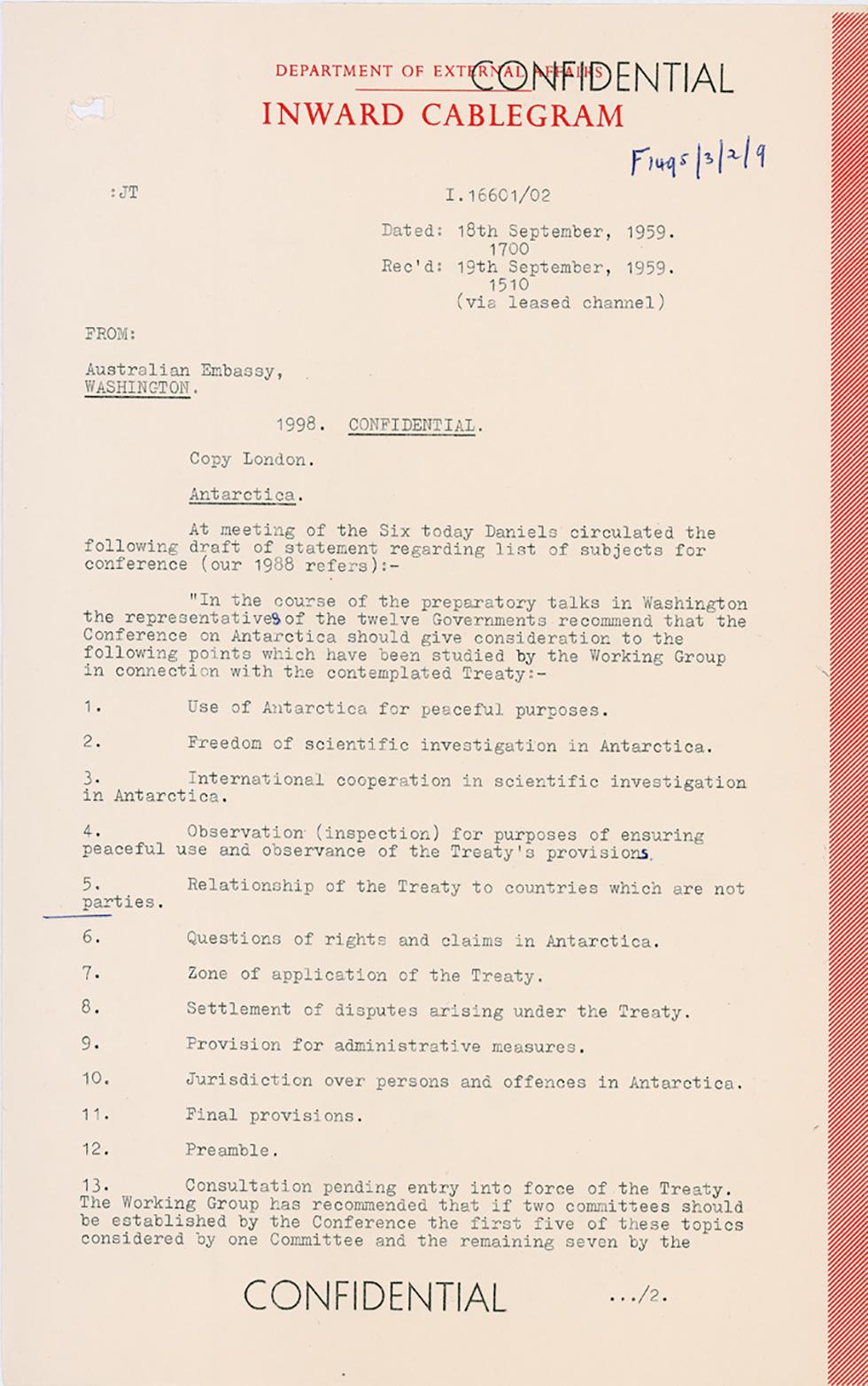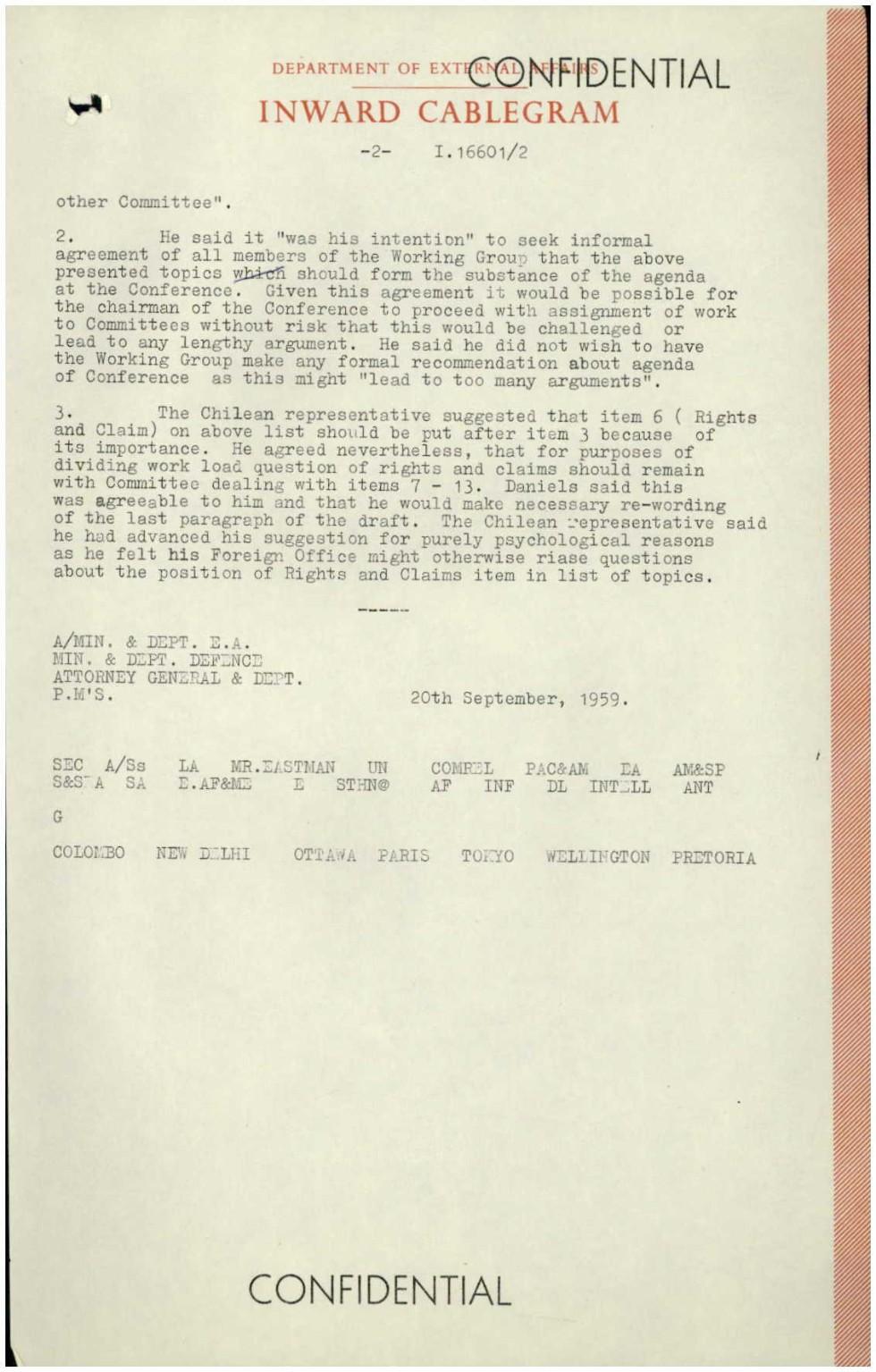
Subjects for the conference

Subjects for the conference
Aboriginal and Torres Strait Islander people should be aware that the National Archives' website and collection contain the names, images and voices of people who have died.
Some records include terms and views that are not appropriate today. They reflect the period in which they were created and are not the views of the National Archives.


Subjects for the conference

Subjects for the conference
[Page 1]
[Stamped in large black letters at top and bottom of the page:] CONFIDENTIAL
[Letterhead in red ink reads 'DEPARTMENT OF EXTERNAL AFFAIRS' and 'INWARD CABLEGRAM'.]
[Handwritten annotation in blue ink:] F1495/3/2/9
:JT
1.6601/02
Dated: 18th September, 1959.
1700
Rec'd [received]: 19th September, 1959
1510
(via leased channel)
FROM:
Australian Embassy,
WASHINGTON.
1998. CONFIDENTIAL [underlined]
Copy London.
Antarctica. [underlined heading]
At meeting of the Six today Daniels circulated the following draft of statement regarding list of subjects for conference (our 1998 refers):-
"In the course of the preparatory talks in Washington the representatives of the twelve Governments recommend that the Conference on Antarctica should give consideration to the following points which have been studied by the Working Group in connection with the contemplated Treaty:-
1. Use of Antarctica for peaceful purposes.
2. Freedom of scientific investigation in Antarctica.
3. International cooperation in scientific investigation in Antarctica.
4. Observation (inspection) for purposes of ensuring peaceful use and observance of the Treaty’s provisions.
5. Relationship of the Treaty to countries which are not parties.
6. Questions of rights and claims in Antarctica.
7. Zone of application of the Treaty.
8. Settlement of disputes arising under the Treaty.
9. Provision for administrative measures.
10. Jurisdiction over persons and offences in Antarctica.
11. Final provisions.
12. Preamble.
13. Consultation pending entry into force of the Treaty. The Working Group has recommended that if two committees should be established by the Conference the first five of these topics considered by one Committee and the remaining seven by the
…/2
[Page] -2-
[Stamped in large black letters at top and bottom of the page:] CONFIDENTIAL
[Letterhead in red ink reads 'DEPARTMENT OF EXTERNAL AFFAIRS' and 'INWARD CABLEGRAM'.]
1.16601/2
other Committee".
2. He said it "was his intention" to seek informal agreement of all members of the Working Group that the above presented topics which [crossed out] should form the substance of the agenda at the Conference. Given this agreement it would be possible for the chairman of the Conference to proceed with assignment of work to Committees without risk that this would be challenged or lead to any lengthy argument. He said he did not wish to have the Working Group make any formal recommendation about agenda of Conference as this might “lead to too many arguments".
3. The Chilean representative suggested that item 6 (Rights and Claim) on above list should be put after item 3 because of its importance. He agreed nevertheless, that for purposes of dividing work load question of rights and claims should remain with Committee dealing with items 7- 13. Daniels said this was agreeable to him and that he would make necessary re-wording of the last paragraph of the draft. The Chilean representative said he had advanced his suggestion for purely psychological reasons as he felt his Foreign Office might otherwise riase [sic] questions about the position of Rights and Claims item in the list of topics.
[dividing line]
A/MIN. & DEPT. E.A. [Assistant or Acting Minister and Department of External Affairs.]
MIN. & DEPT. DEFENCE [Minister and Department of Defence.]
ATTORNEY GENERAL & DEPT. [Attorney General and Department]
P.M'S. [Prime Minister’s Department]
20th September, 1959
SEC A/Ss LA MR. EASTMAN UN COMREL PAC&AM EA AM&SP
S&S A SA E.AF&ME E STHNE@ AF INF DL INTELL ANT
G
COLOMBO NEW DELHI OTTAWA PARIS TOKYO WELLINGTON PRETORIA
Leading up to the Antarctic Treaty Conference in 1959, an inner group of 6 countries (Argentina, Australia, Chile, New Zealand, the United Kingdom and the United States of America) met privately to consider particularly sensitive problems.
Learn how to interpret primary sources, use our collection and more.
